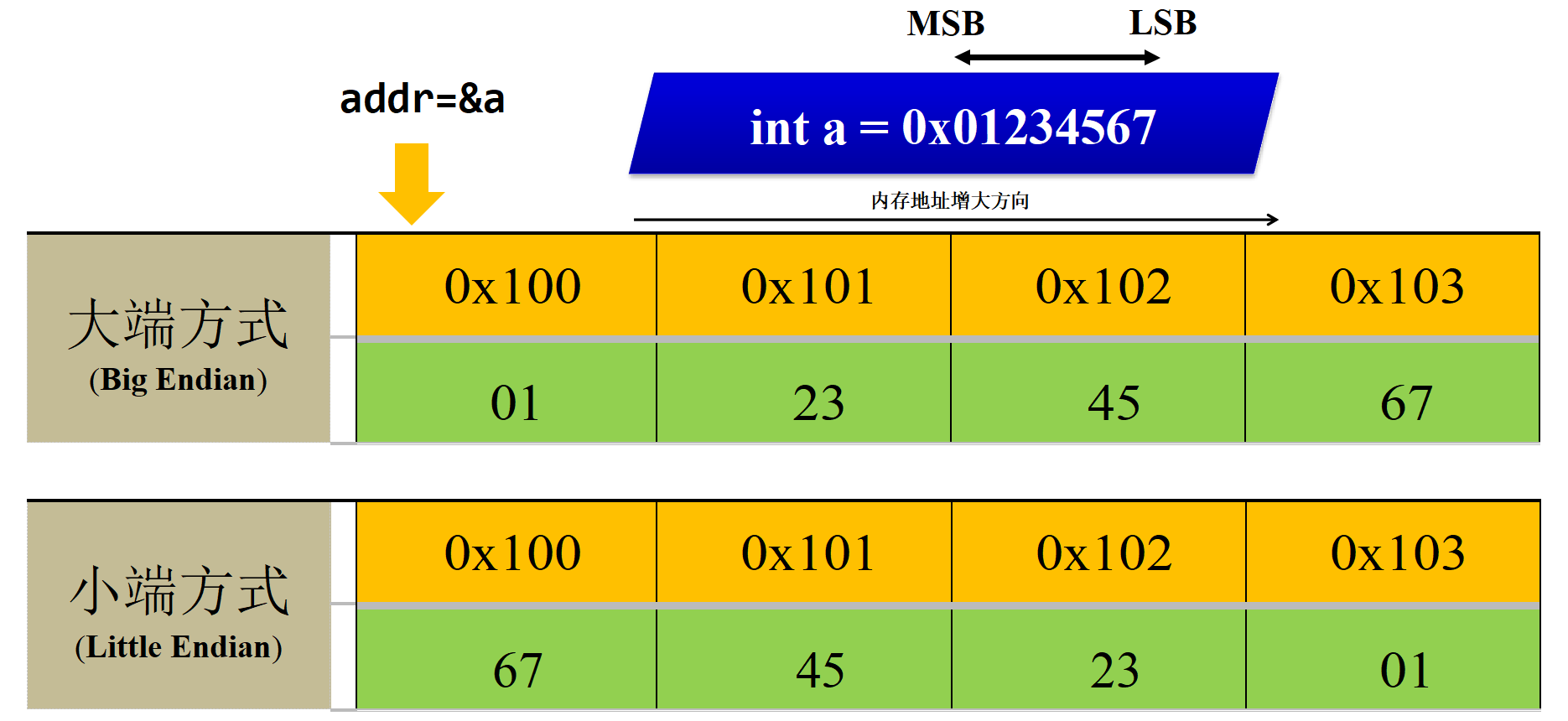Endian
寻址
多字节对象被存储为连续的字节序列,对象的地址为所使用字节中最小的地址。
例如,假设一个类型为 int 的变量 a 的地址为 0x100,也就是说,地址表达式 &a 的值为 0x100。那么,(假设数据类型 int 为32位表示) a 的 4 个字节将被存储在内存的 0x100、0x101、0x102 和 0x103 位置。
字节顺序
最低有效字节存储在起始地址,这称为小端(Little Endian)字节序;最高有效字节存储在起始地址,这称为大端(Big Endian)字节序。
术语“小端”和“大端”表示多字节值的哪一端(小端或大端)存储在该值的起始地址。
大多数 Intel 兼容机都只用小端模式。另一方面,IBM 和 Oracle 的大多数机器则是按大端模式操作。
在下图中,我们标明内存地址增长的方向为从左到右。我们还标明最高有效位(Most Significant Bit,MSB)是这个32位值最左边一位,最低有效位(Least Significant Bit,LSB)是这个32位值最右边一位。 最高有效字节(Most Significant Byte)是 Byte3=0x01,最低有效字节(Least Significant Byte)是 Byte0=0x67 。


Endian Conversion Functions
我们把某个给定系统所用的字节序称为主机字节序(host byte order),网络协议为网络字节序(network byte order)(大端字节序)。
网络字节序是大端字节序。
Linux
下面4个函数是主机字节序和网络字节序之间相互转换的函数。在这些函数的名字中,h代表host,n代表network,s代表short,l代表long。short和long这两个称谓是出自4.2BSD的Digital VAX实现的历史产物。如今我们应该把s视为一个16位的值(例如TCP或UDP端口号),把l视为一个32位的值(例如IPv4地址)。事实上即使在64位的Digital Alpha中,尽管长整数占用64位,htonl和ntohl函数操作的仍然是32位的值。
当使用这些函数时,我们并不关心主机字节序和网络字节序的真实值(或为大端,或为小端)。我们所要做的只是调用适当的函数在主机和网络字节序之间转换某个给定值。在那些与网际协议所用字节序(大端)相同的系统中,这四个函数通常被定义为空宏。
// converts host byte order and network byte order
#include <arpa/inet.h>
uint32_t htonl(uint32_t hostlong);
uint16_t htons(uint16_t hostshort);
uint32_t ntohl(uint32_t netlong);
uint16_t ntohs(uint16_t netshort);
These functions convert the byte encoding of integer values from the byte order that the current CPU(the "host") uses, to and from little-endian and big-endian byte order.
// These functions convert the byte encoding of integer values from the byte order that the current CPU (the "host") uses,
// to and from little-endian and big-endian byte order.
#include <endian.h>
uint16_t htobe16(uint16_t host_16bits);
uint16_t htole16(uint16_t host_16bits);
uint16_t be16toh(uint16_t big_endian_16bits);
uint16_t le16toh(uint16_t little_endian_16bits);
uint32_t htobe32(uint32_t host_32bits);
uint32_t htole32(uint32_t host_32bits);
uint32_t be32toh(uint32_t big_endian_32bits);
uint32_t le32toh(uint32_t little_endian_32bits);
uint64_t htobe64(uint64_t host_64bits);
uint64_t htole64(uint64_t host_64bits);
uint64_t be64toh(uint64_t big_endian_64bits);
uint64_t le64toh(uint64_t little_endian_64bits);
Boost
Boost.Endian: The Boost Endian Library - 1.77.0
References
byteorder(3) - Linux manual page (man7.org)